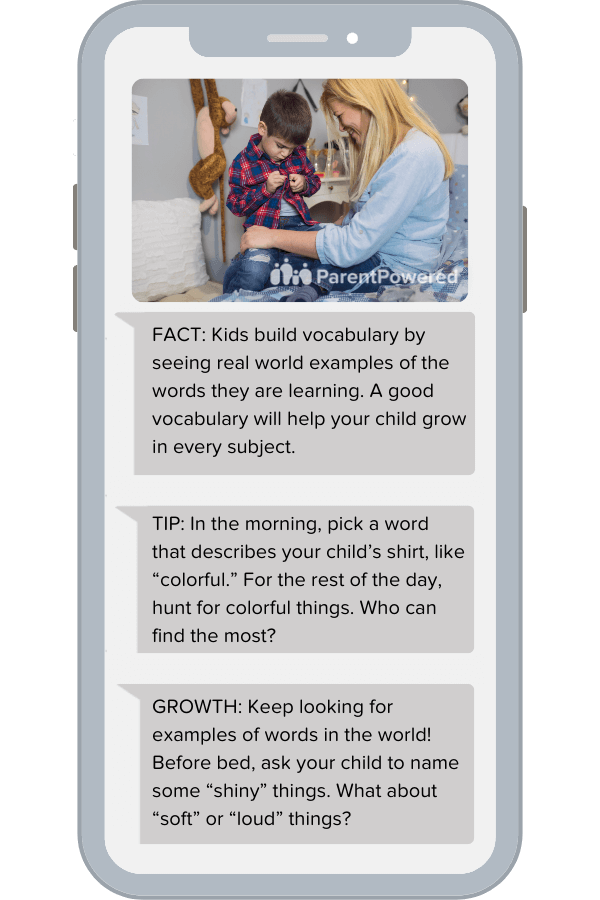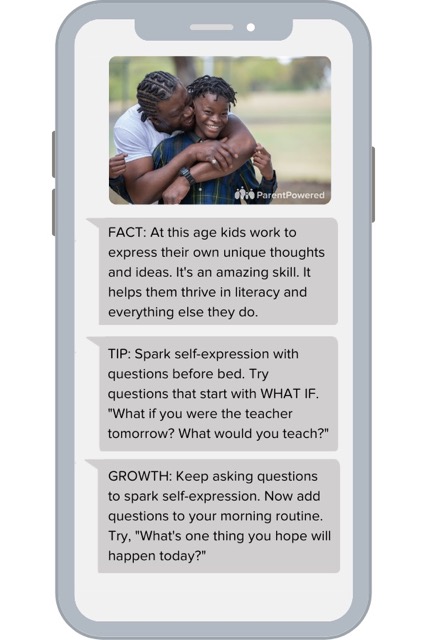By April Hawkins, former marketing manager
Literacy skills can be fun for parents and caregivers. I learned this firsthand when my spouse and I signed up to be foster parents. Before we knew it, we had three kids in our care, including a first grader who had not yet learned to read. We taught her basic skills needed to progress in literacy by pointing out letters on her favorite JoJo Siwa poster, and having her “read” us the pictures from storybooks. She would come up with amazing, creative stories about what she thought was happening in the book.
I was surprised by how fun these literacy skill building activities were, and by how quickly she began pointing out letters herself. These moments went a long way in developing her literacy skills, which I know are critical for many school and life outcomes like student achievement and career readiness. But there was something else happening in these moments. We were bonding, and she was taking major steps towards building comfort in expressing herself. As these skills have grown, they have helped her share how she feels and what she’s thinking. Through these everyday literacy activities and lessons, we were building our relationship.
Effective early literacy all year long
It turns out that I’m not alone in this experience. A few years ago, we conducted a survey to explore what early literacy skills families enjoy building at home with their children (we continue to survey our families quarterly for such insights). We discovered that many parents were seeing social emotional benefits in literacy activities.

As you probably know, ParentPowered sends messages to parents and caregivers which offer early literacy activities anchored in evidence-based approaches (like the science of reading). These messages orients parents around a specific literacy skill, like telling the time. With each nudge, parents can build on the skill through an everyday moment.
This model is based on research demonstrating the effectiveness of using technology like text messages to help families support children to build basic skills needed for strong reading. The ParentPowered approach has been shown repeatedly to increase family and student engagement at home and school, as well as increase child learning by 2 to 3 months over the course of a school year.
The activities that help build early literacy skills also help caregivers communicate and create a bond with their children. When going through parent surveys, we found that there were certain literacy skills parents really loved doing with students — including reading comprehension strategies, fluency in reading, vocabulary, and more. We want to share their five favorite activities with you to spark ideas for continued learning!
1. Questions and Conversations for the WIN!
Parents and caregivers sent a lot of positive feedback about activities that invite them to ask open-ended questions and help children start expressing themselves linguistically. They loved receiving prompts that tell them how to start and continue a conversation with their little one.
Here is our favorite quote from a parent sharing how these conversations boosted their time with their children:
“My favorite activities are things like asking ‘what if…’ or ‘what is like…’ and just general conversation tips. It helps our relationship develop. Keeps it from just being ‘I’m an adult and you are a child’ into ‘we can talk about anything.’”
We know questions and conversations build language skills. Introducing narrative skills, such as storytelling and describing events, is crucial for children’s reading comprehension and overall literacy development. Parents and caregivers are calling out these incredible gains for the simple connections they build.
2. Self-Talk to Spark Literacy
Educators understand the important role that self-talk plays in child development. Teaching kids to pay attention to the words they say inside their heads and share them is a very valuable tool for helping them develop key skills in self-reflection and communication, which are essential tools for building great self-esteem.
Reflecting on their thoughts helps children identify and focus on the values that will help them become self-sufficient, and good citizens. Parents and caregivers shared that they really enjoy these types of activities because everyday moments, like doing chores, become an opportunity to talk to each other.

3. Books and Stories are a Blast
We know books are important, but they really serve as a window into a whole new world. Parents love reading books and telling stories with their children, and this is crucial. Building a love of books and reading from a young age helps foster motivation and engagement.
They shared that reading a story together and asking children questions brought them closer to their child. Here are a few of our favorite parent and caregiver quotes about reading activities:
“We are busy, I love listening to him read out loud. Hearing his confidence grow is my favorite thing!”
“Reading books together [is my favorite activity]. Fun for both mom and toddler and time to slow down and connect during busy days.”
4. Family Fun with Phonics and Phonemic Awareness

The science of reading emphasizes a structured approach to teaching reading, integrating components like phonemic awareness, phonics, vocabulary, and comprehension to enhance early literacy skills.
As educators, we understand the importance of phonics as a building block to the foundation of reading. From a parent perspective, the best part here is that phonics (and phonemic awareness) can be the fun they add to everyday learning moments.
Parents and caregivers shared that phonics activities especially make the trip to the grocery store easier, help kids get dressed in the morning, and make chores go by faster. One caregiver shared that she loves to play phonemic awareness games with her child like making up songs and rhymes while doing chores. Another parent invites his children to talk like robots while cleaning up the house. It turns out that a trip to the store can be a lot more fun when kids are looking for letters and words while parents and caregivers shop.
5. Building Writing Skills is the Best!
Parents are so proud to watch their children form letters and to start recognizing words, including their own names. Writing was one of parents’ favorite early literacy skills because it makes learning visible. Recognizing and engaging with written word in everyday environments enhances reading and writing skills, making it an essential part of literacy development.
Here’s our favorite parent quote about writing:
“Our son is into recognizing his name and practicing writing it! It’s perfectly imperfect every time! And that’s what makes it so precious because he picks up more of it each time we do it. Also the breathing helps BOTH of us immensely!”
Market Those Literacy Skills!
One common thread was clear in parent survey responses: They love learning activities that make the day easier and bring them closer to their children. This is an excellent opportunity for educators to engage parents in early literacy activities. When educators talk to parents about the importance of basic skills for literacy, they may consider connecting activities from classroom lesson plans with at-home learning opportunities.
For example, try sending an email with ten ways to connect with your child through literacy skill building activities. Always make sure your communication can cross the digital divide and is accessible to all families in your community. Texting is often the best way to reach families, and has 400% more engagement than email.
These survey results are a huge win for literacy. At a time when educators are seeking different types of strategies to help students improve learning outcomes and nurture social-emotional support, it is refreshing to see that both are possible!









